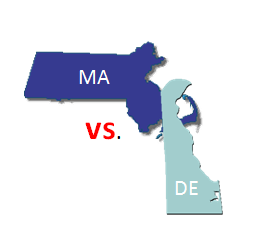Stay in the know
Subscribe to the Real Estate Blog and we’ll send you an email each time something new is posted.
Subscribe to the Real Estate Blog and we’ll send you an email each time something new is posted.
Blogs
Real Estate Blog
Choosing Between Massachusetts and Delaware LLCs – A Practical Approach
 The Limited Liability Company (“LLC”) has become the entity of choice for many owners and operators of commercial real estate, because LLCs provide limited liability, greater flexibility than corporations and pass-through taxation. For business owners located in Massachusetts, choosing the Commonwealth of Massachusetts as the state of formation for an LLC is very often the default choice, since doing so is easier and less expensive than forming the LLC in Delaware. However, many people are unaware of the significant differences between Massachusetts and Delaware LLC law. What follows is a discussion of 8 different questions to consider when deciding where to form an LLC and some practical suggestions:
The Limited Liability Company (“LLC”) has become the entity of choice for many owners and operators of commercial real estate, because LLCs provide limited liability, greater flexibility than corporations and pass-through taxation. For business owners located in Massachusetts, choosing the Commonwealth of Massachusetts as the state of formation for an LLC is very often the default choice, since doing so is easier and less expensive than forming the LLC in Delaware. However, many people are unaware of the significant differences between Massachusetts and Delaware LLC law. What follows is a discussion of 8 different questions to consider when deciding where to form an LLC and some practical suggestions:
- Will an Experienced Massachusetts Corporate Attorney Draft the LLC’s Operating Agreement? Under the Massachusetts LLC Act (M.G.L. c. 156C), there are several onerous statutory provisions that apply to Massachusetts LLCs, which are not found in the Delaware LLC Act (6. Del. Chapter 18). However, many of these provisions apply to Massachusetts LLCs only to the extent not addressed in a written operating agreement. They affect LLC members’ ability to lend or borrow money, be indemnified by the LLC, be released from personal liability, participate in management decisions, receive member distributions, admit new members to the LLC, bring suit in the name of the LLC and/or effect a merger of the LLC. If the LLC operating agreement is drafted properly, these Massachusetts statutory provisions will not impede the operation of the Massachusetts LLC. But if not properly considered, the Massachusetts LLC Act could cause unforeseen problems.
- Are Fiduciary Duties Desired Among Members and Managers? The general consensus is that under Delaware law, fiduciary duties between or among the LLC’s managers and/or members may be eliminated by express language in a written operating agreement. In fact, under Delaware law, it may even be the case that fiduciary duties may not be imposed between or among members and managers absent specific language to the contrary in a written operating agreement. Under Massachusetts law, the default position imposes the same fiduciary duties upon managers and members of LLCs as are imposed on shareholders and officers of privately held corporations – the duty of utmost good faith and loyalty. Moreover, the Massachusetts LLC Act does not make it clear that fiduciary duties may be eliminated in a written LLC Operating Agreement, and the issue has yet to be tested in Massachusetts courts. If the elimination of fiduciary duties is important to a manager or member, formation in Delaware should be seriously considered.
- What Level of Indemnification is Required? Under Delaware law, an LLC can indemnify and hold harmless any person against any claim, provided the indemnity is not against public policy. Under Massachusetts law, indemnification is not available for any person adjudicated to have not acted in good faith with the reasonable belief that his actions were in the best interest of the LLC. While acting in “good faith” is a reasonable standard of conduct, if absolute indemnification is desired, formation of the LLC in Delaware should be considered.
- Should A Member Be Allowed To Unilaterally Resign from the LLC? Massachusetts law permits any member to resign as a member upon 6 months prior notice and receive the “fair value” of his or her member interest even if the operating agreement provides to the contrary. Under Delaware law, however, a member may not resign from and LLC if prohibited from doing so under the operating agreement.
- Under What Circumstances Should Members Be Personally Liable For “Clawbacks”? Under the Delaware LLC Act, LLC members may be personally liable to the LLC if the member knew at the time he received a distribution that the LLC was either insolvent or made insolvent by the distribution. Under Massachusetts law, a member may be personally liable to the LLC and other members if he votes for or assents to distributions that violate the operating agreement. Since clawbacks are only available under Delaware law for knowing violations of the applicable section of the Delaware LLC Act, if the intent is to limit clawbacks, Delaware law is preferable.
- Should a Charging Order Be the Exclusive Remedy for a Member’s Judgment Creditor? Under both Delaware and Massachusetts law, upon application to the applicable court, an LLC may be charged interest when satisfying a judgment entered against a member of the LLC. This is referred to as a “charging order”. However, Delaware law makes a charging order the exclusive remedy by which a judgment creditor of a member or of a member’s assignee may satisfy a judgment. Massachusetts law, however, does not expressly make a charging order a judgment creditor’s exclusive remedy. For those concerned about limiting the rights of a fellow member’s judgment creditors, Delaware law may be preferable.
- Might the LLC Enter Into A CMBS Loan or Bring In An Institutional Investor? Most servicers of securitized (i.e., CMBS) loans require their borrowers to be Delaware LLCs. Similarly, many venture capital firms or large institutional investors will only invest in Delaware LLCs. If the LLC anticipates entering into a CMBS loan or admitting an institutional investor, formation in Delaware makes sense.
- Can The LLC Afford To Form In Delaware? There is no escaping the fact that if the business of the LLC is in Massachusetts, forming an LLC in Delaware will result in more annual fees. For LLCs formed and doing business exclusively in Massachusetts, the filing fee to form and maintain the LLC in good standing is $500.00 and $500.00 annually thereafter. Forming a Delaware LLC initially costs $90.00, with annual fees of $250.00 plus an annual fee to pay a corporate servicer in Delaware of approximately $250.00. Since forming an LLC in Delaware to do business in Massachusetts will require the LLC to qualify (i.e. register) in Massachusetts as a foreign LLC, the LLC’s filing fees may double. The increase in compliance costs should be weighed against the potential benefits offered under Delaware LLC law.




